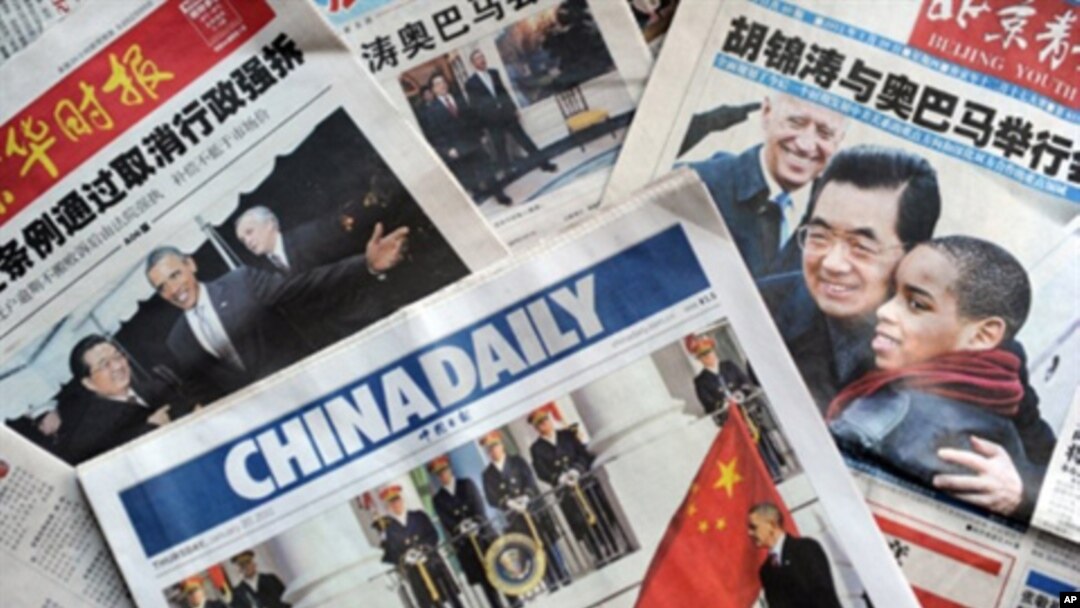News of Chinese President Hu Jintao's visit to the White House is splashed across major newspapers in China. But with media notoriously censored, VOA wondered what exactly the Chinese press is saying about the visit. To find out, VOA's Kate Woodsome talked with Jeremy Goldkorn, the Beijing-based editor of danwei.org, a website that keeps track of Chinese media, advertising, and urban life.
Listen to the full interview:
What are the headlines in China about the Hu Jintao visit?
"It’s very much boiler plate. Chinese newspaper and newspaper organizations are generally instructed to just use the approved copy from Xinhua News Agency, which is the state news agency, so there’s not a big range of types of coverage. Quite a lot of it has focused on the so-called image advertisements that the government has been running on CNN and on the screens at Times Square in New York, talking about the campaign to improve China’s image in America. Like, the front page of the Beijing News had a massive picture of Time Square showing screens displaying this advertisement. But very much boiler plate; the kinds of things that Hu Jintao said in his speeches were repeated unquestioningly in the media."
I was interested to see that Xinhua did mention human rights and the fact that Hu Jintao talked about human rights.
"They did. I don’t know how much of that was actually in the Chinese coverage, but there was certainly a mention of it. But that’s not really a new thing. He didn’t say anything substantially different from what other Chinese officials have said in the past."
Would you say that what appears in the English-language news is different from what appears in the Chinese-language news?
"Yes, always. If you compare, for example, the Chinese home page of Xinhua with the English homepage of Xinhua, you’ll find every day a completely different collection of stories."
What have the bloggers been talking about online?
"It hasn’t been a topic of really heated discussion. When it comes to America, there’s always a certain percentage of the Chinese Internet population that is inclined to be nationalist and to be very suspicious of America. And you certainly saw people commenting on, particularly after the stealth jet photos were spread around the Internet, you had a lot of people saying, ‘Oh good, now he’s [Hu Jintao is] going to America. Yes, we’re strong. It’s good. China should be strong. We shouldn’t take any nonsense from America.’ This kind of sentiment is fairly common.
But you also see another group of people who look at the coverage in the U.S. of the discussion of the decline of the United States and China’s rise, China becoming a super power. There’s a significant group of people on the Internet who are very doubtful of that and who don’t see China becoming an equal to the United States any time soon."
Next Media Animation, the Taiwan animators who take a satirical approach to news reporting, did an animated version of this trip. What did they have to say?
"Their animation portrayed Hu as being very aggressive and going to America to basically tell Obama what’s what, deal with his banker. That was their approach to it. But it should be noted that their videos are circulated on YouTube, which is blocked in China. So it’s not something that was circulated widely within China itself."
It was pretty funny. They had Hu Jintao taking measurements in the White House as if he was going to move in.
"That’s right. It’s sort of a continuation of a previous animation they did in which there was a rap battle between Hu Jintao and Obama discussing many of the bigger Sino-American problems. It’s part of kind of a tradition they’re developing."
Even though this is a satirical approach to the news events, is this a popular opinion of the dynamic between China and the U.S.?
"There’s no question that a lot of people in China feel that China has now become sufficiently strong that it no longer should be in a position of having to listen to lectures given by the rest of the world. That it’s time for China to reclaim its rightful place as a major power and everything that entails. That certainly is a very common sentiment in China. But one also encounters many, many people who are not quite as impressed by China’s rise as the kind of commentary you see in the United States. A lot of Chinese people are very doubtful about how powerful China really is, and how great a nation it can become.
So, you do see very clearly two different ways of looking at it. On the one hand, you see people are very happy that China has become a real player on the world stage and would like China to be more powerful and more aggressive. And you have another group of people who have real doubts about how real this is."


